This product is no longer manufactured. Remaining stock may still be available. Please refer to the alternatives listed below under "Similar products" or contact us directly.
Alternative Products for this discontinued product:
ISD-100HF-BTS256-LED
System for the Luminous Flux Measurement of 2π and 4π Light Sources
- Integrating sphere with a 1000 mm diameter, hemispherical shell for opening and closing
- Auxiliary lamp
- BTS256-LED Light meter for accurate measurement of luminous flux, spectral radiant power, CCT, CRI, chromaticity coordinates, User software, etc.
- Option for measuring flicker and TLA according to CIE:TN-006, IEC TR 61547, IEC TR 63158, Mp ASSIST, JA10, IES:RP-16-10, IEEE 1789-2015, etc.
- Options: quadripole test sockets, additional port
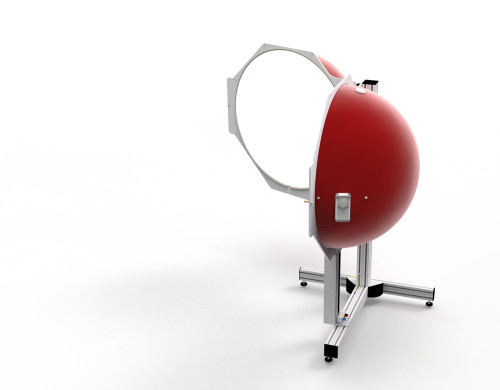
The BTS256-LED light meter
In its standalone mode, the compact BTS256-LED meter is designed for the convenient measurement of luminous flux, spectrum, color, and color rendering index of single LEDs. A key feature is the conical measurement port at the entry of the internal integrating sphere which enables the measurement of onboard LEDs. The bayonet connector used to attach the conical adapter makes it possible to combine the BTS256-LED with other accessory components. Gigahertz-Optik offers different accessories as part of the BTS256-LED Plus Concept which greatly extends the measurement capabilities of the BTS256-LED.
Enhancement of the BTS256-LED using the ISD-100HF-V01 or ISD-100HF-V02 integrating sphere
The 100 cm diameter ISD-100HF-V01 integrating sphere makes it possible to measure the luminous flux, spectrum, color, and color rendering index of extra-large LED lamps with 2 pi and 4pi radiation characteristics inside the sphere. One half of the sphere can be opened in order to fix LED lamps onto the sample holder at the center of the sphere. The height of the sample holder can be adjusted. The ISD-100HF-V02 is offered as an alternative and has an additional measurement port with a 254 mm diameter for the measurement of 2pi lamps. This remains closed whenever it is not in use. Both variants are equipped with an auxiliary lamp. The BTS256-LED can still be used to measure single, onboard LEDs. A bayonet adapter enables connection of the device onto the ISD-100HF integrating sphere.
Determination of flicker properties and TLA
In addition to the investigation of light-metric quantities such as luminous flux, spectrum, color, etc., other properties of light sources play a significant role. In order to be able to offer light sources on the European market, an investigation of temporal intensity modulations such as light flicker and stroboscopic effects is necessary according to the Ecodesign Directive. This application field is summarized under the term "Temporal Light Artefacts (TLA)".
Gigahertz-Optik offers the integrating sphere model ISD-100HF-V08 as a variant. In addition to the spectroradiometer BTS256-LED Tester, this model offers the option of connecting an additional photodiode-based detector. It enables the measurement of flicker and TLA in conjunction with the PFL-200 measuring device.
In detail, the following measured quantities become available:
- Percent Flicker (IEEE Std 1789-2015, IES: RP-16-10, CIE:TN-006, CIE:TN-012)
- Flicker Index (IEEE Std 1789-2015, IES: RP-16-10, CIE:TN-006, CIE:TN-012)
- FFT Frequency component analysis
- Pst Short term flicker severity (CIE:TN-006, CIE:TN-012, IEC TR 61547)
- Stroboscopic Visibility Measure, SVM (CIE:TN-006, CIE:TN-012, IEC TR 63158)
- Mp ASSIST Flicker perception metric
- Joint Appendix JA10
Calibration
One essential quality feature of photometric devices is their precise and traceable calibration. The ISD-100-HF with the BTS256-LED is calibrated by Gigahertz-Optik’s calibration laboratory that is accredited by DAkkS (D-K-15047-01-00) for the spectral responsivity and spectral irradiance according to ISO/IEC 17025. Calibration for the luminous flux is performed using a BN-LHSF-104, which is placed at the sphere center. Spheres with an additional measurement port require additional calibration with a BN-LHSF-2P-20 calibration lamp, which has 2pi radiation characteristics in the integrating sphere. Every device comes with its respective calibration certificate.

BTS256-LED spectroradiometer with integrating sphere ISD-100HF-V01 for 2pi and 4pi LED lamps inside the sphere. ISD-100HF-V02 with additional measurement port with plug.
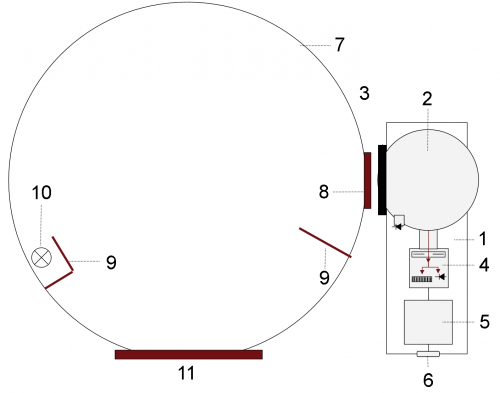
1) BTS256-LED 2) 50mm integrating spherel 3) Precision bayonet mount 4) BiTec sensor with Si photodiode, CMOS diode array spectrometer and shutter 5) Microprocessor 6) USB interface 7) ISD-21 integrating sphere 8) Bayonet mount 9) Baffle 10) Auxiliry lamp 11) Measurement port
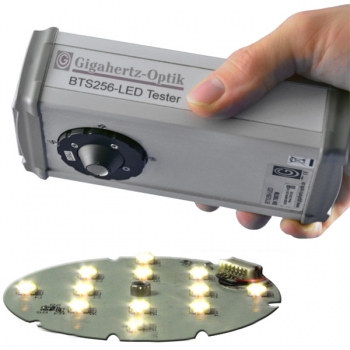
BTS256-LED for measurement of the luminous flux, spectrum, color, and color rendering index of single LEDs
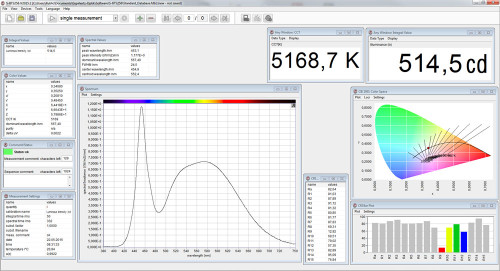
The S-BTS256 user software for the luminous flux with integrated and external sphere.
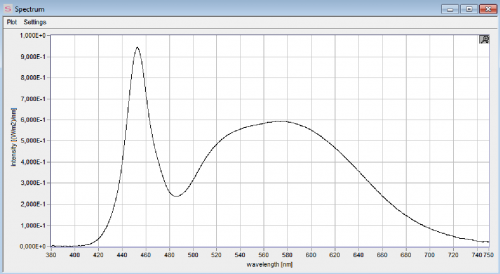
Full screen display of the luminous spectrum
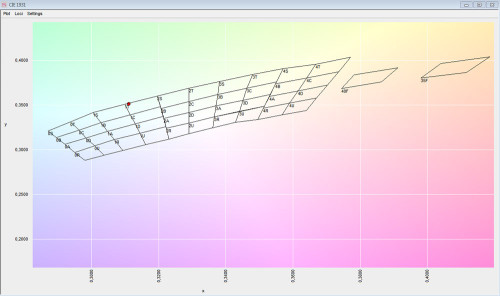
CIE 1931 chromaticity diagram with binning fields
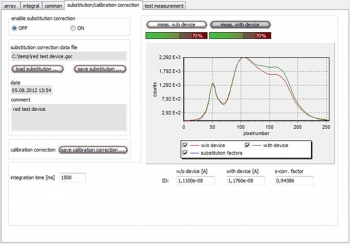
Substitution correction menu